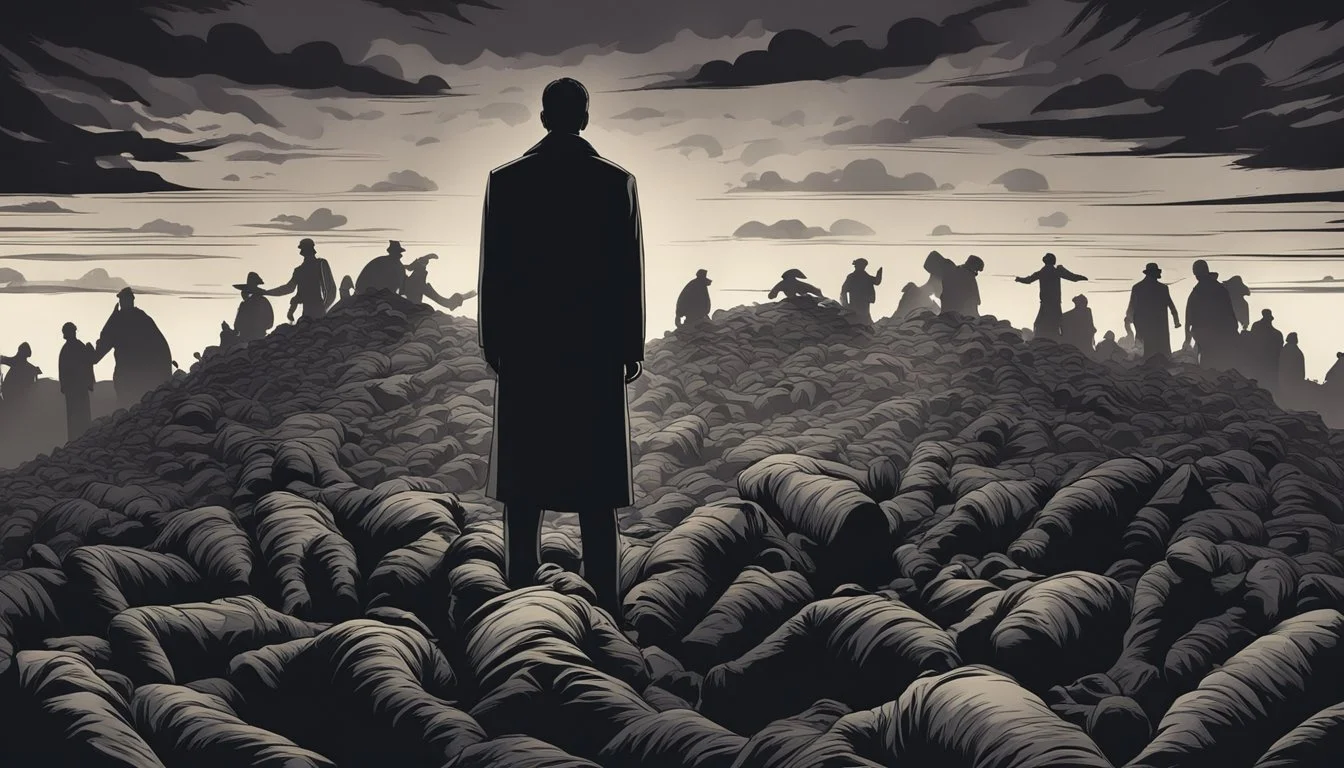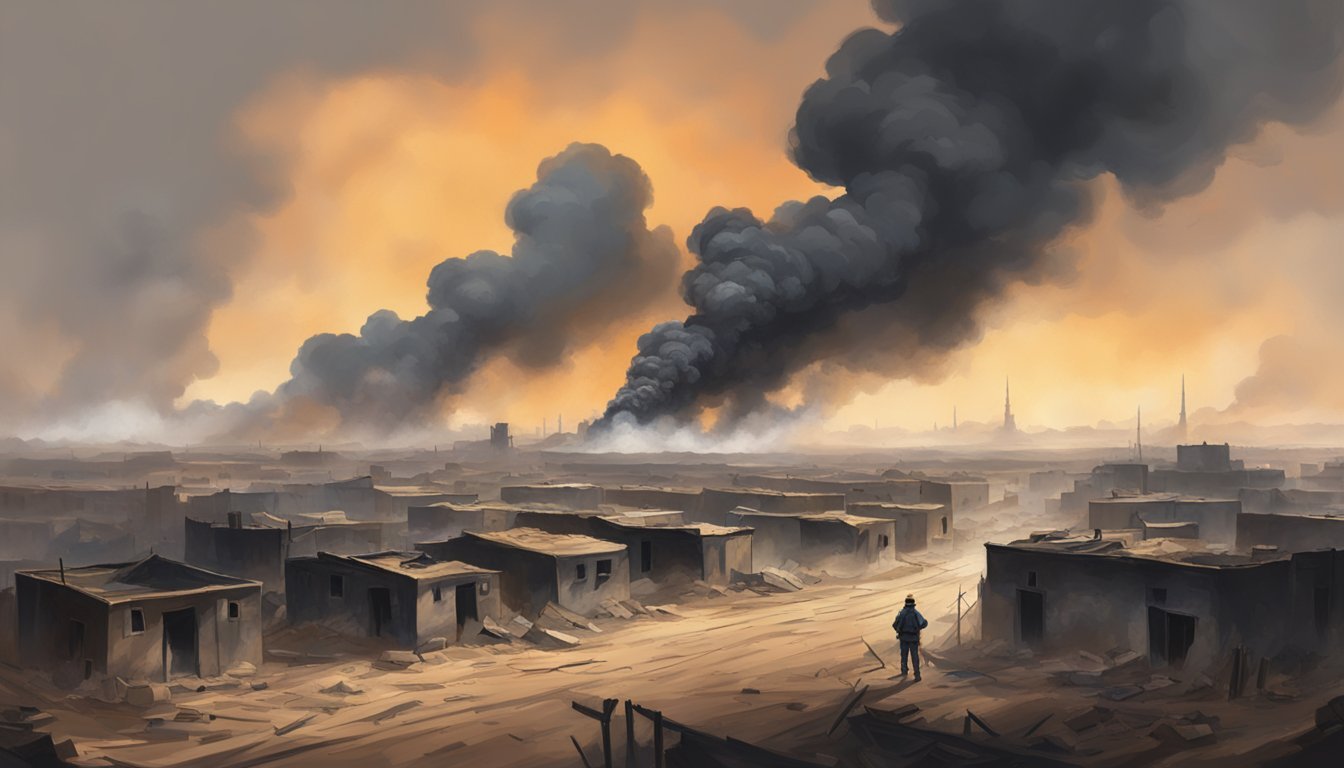Exposing War Crimes: The Actual Events of The Act of Killing
Uncovering Indonesia's Dark History
"The Act of Killing" is a groundbreaking documentary that exposes the brutal mass killings in Indonesia during 1965-66. The film challenges former death squad leaders to reenact their crimes, providing a chilling glimpse into the minds of perpetrators who have never faced justice. By confronting these individuals with their past actions, the documentary reveals the lasting trauma and complex moral questions surrounding war crimes.
The film's unique approach allows viewers to witness the psychological impact on killers like Anwar Congo as they recreate their violent acts. This method brings to light the horrific nature of the genocide while also exploring how perpetrators have rationalized their actions over time. The documentary raises important questions about how societies deal with past atrocities and the long-term effects on both victims and perpetrators.
Through its unflinching examination of the Indonesian killings, "The Act of Killing" forces audiences to confront uncomfortable truths about human nature and the aftermath of large-scale violence. It serves as a powerful tool for understanding historical events that have often been overlooked or deliberately obscured. The film's impact extends beyond its subject matter, prompting discussions about accountability, memory, and the lasting consequences of unpunished war crimes.
Background of 'The Act of Killing'
'The Act of Killing' exposes the dark history of Indonesia's 1965-66 mass killings through a unique documentary approach. It explores the perpetrators' perspectives and the lasting impact of these events on Indonesian society.
Historical Context
In 1965, following an alleged communist coup attempt, the Indonesian military and affiliated death squads launched a brutal anti-communist purge. This campaign resulted in the deaths of an estimated 500,000 to 1 million people, including communists, ethnic Chinese, and alleged leftists.
The killings marked a pivotal moment in Indonesian history, ushering in Suharto's "New Order" regime. For decades, the government suppressed discussion of these events and portrayed the perpetrators as national heroes.
The massacres remained largely unexamined both domestically and internationally until recent years.
Overview of the Documentary
'The Act of Killing', directed by Joshua Oppenheimer, takes an unconventional approach to documenting historical atrocities. The film invites former death squad leaders to reenact their crimes on camera.
These reenactments range from surreal, Hollywood-style scenes to more somber reconstructions. Through this process, the film explores the killers' mindsets and the ways they've justified their actions.
The documentary features Anwar Congo, a former executioner who killed hundreds of people. It follows his journey as he confronts his past actions through the filmmaking process.
Filmmaker's Inspiration and Objectives
Oppenheimer's interest in Indonesia's dark history began while working on 'The Globalization Tapes' in 2001-2002. This earlier project exposed him to survivors' stories and the lasting impact of the 1965-66 killings.
The director's primary objective was to shed light on this overlooked chapter of history. He aimed to challenge the official narrative and explore how perpetrators of mass violence rationalize their actions.
Oppenheimer sought to create a film that would spark dialogue within Indonesia about the country's past. He also wanted to draw international attention to these events and their ongoing repercussions in Indonesian society.
Content Analysis
"The Act of Killing" presents a complex examination of Indonesia's 1965-66 mass killings through unconventional documentary techniques. The film's content analysis reveals its unique approach to exploring historical atrocities and their lasting impacts.
Portrayal of Perpetrators
The documentary focuses on Anwar Congo and other former death squad leaders. It depicts them not as one-dimensional villains, but as multifaceted individuals grappling with their past actions. The film shows Congo's daily life, including interactions with family and friends, juxtaposed with his brutal history.
Director Joshua Oppenheimer allows the perpetrators to speak freely about their involvement in the killings. This unfiltered access provides insight into their mindsets and rationalizations. The subjects often display a lack of remorse, even pride, in their past deeds.
The film avoids traditional narrative structures, instead letting the perpetrators guide much of the content. This approach creates a disturbing yet revealing portrait of how individuals can normalize extreme violence.
Reenactments of Violence
A central feature of the documentary is the reenactment of violent acts by the perpetrators themselves. Congo and others recreate interrogations, torture, and killings using various cinematic styles.
These scenes range from surreal musical numbers to gritty gangster film homages. The reenactments serve multiple purposes:
They illustrate the specific methods used during the killings
They reveal the perpetrators' attitudes toward their actions
They create cognitive dissonance as the subjects confront their pasts
The film's use of reenactments blurs the line between documentary and fiction. This technique challenges viewers to consider how historical narratives are constructed and internalized.
Psychological Impact on Subjects
As the film progresses, it documents the psychological effects of revisiting past atrocities on the subjects. Congo, in particular, exhibits signs of internal conflict and growing unease.
Key observations include:
Nightmares and sleep disturbances reported by Congo
Moments of emotional breakdown during reenactments
Attempts to justify or distance themselves from past actions
The film captures subtle shifts in body language and facial expressions as subjects wrestle with their memories. In some instances, perpetrators express regret or acknowledge the weight of their actions for the first time.
This psychological journey forms a crucial part of the documentary's narrative. It raises questions about memory, guilt, and the long-term effects of participating in mass violence.
Ethical Considerations
"The Act of Killing" raises profound ethical questions about documentary filmmaking and the portrayal of war crimes. The film's approach challenges traditional methods of exploring sensitive historical events.
Treatment of Sensitive Material
The documentary's unconventional technique of having perpetrators reenact their crimes sparks debate. Some argue it provides unique insights into the mindset of killers. Critics contend it risks glorifying or trivializing atrocities.
The film's graphic depictions of violence, though simulated, may be traumatizing for viewers. This raises questions about the responsibility of filmmakers to balance truth-telling with potential harm.
Oppenheimer's choice to focus on perpetrators rather than victims is ethically complex. It offers a rare perspective but may neglect the voices of those most affected by the genocide.
Rights and Dignity of Involved Parties
The film's subjects willingly participate, but ethical concerns arise about their full understanding of potential consequences. Their candid admissions could lead to legal repercussions or social ostracism.
Questions of informed consent are particularly relevant given the film's global reach. Participants may not have anticipated the international scrutiny they would face.
The documentary's impact on Indonesia's collective memory and national identity raises ethical considerations. It challenges official narratives and forces a confrontation with a painful past.
Protecting the identities of crew members was crucial due to potential dangers. This highlights the risks involved in exposing war crimes through documentary filmmaking.
Reception of the Documentary
"The Act of Killing" sparked intense discussions among critics, audiences, and political figures worldwide. Its unconventional approach to documenting historical atrocities elicited both praise and controversy.
Critical Acclaim and Critiques
The documentary received widespread critical acclaim. Many reviewers praised its innovative storytelling and unflinching portrayal of historical events. It earned numerous awards, including a BAFTA for Best Documentary.
Some critics questioned the ethics of giving perpetrators a platform to reenact their crimes. They argued this approach could potentially glorify violence or retraumatize victims.
The film's surreal elements and creative liberties taken with the reenactments also drew mixed reactions. Some praised the artistic choices as powerful tools for revealing deeper truths. Others felt they detracted from the documentary's credibility.
Public and Political Reactions
In Indonesia, the film initially faced censorship and was not publicly screened. However, it circulated underground and sparked debates about the country's past.
Many Indonesians welcomed the documentary as a chance to confront long-suppressed history. Others criticized it as foreign interference in domestic affairs.
Internationally, "The Act of Killing" raised awareness about the 1965-66 Indonesian massacres. It prompted discussions in political circles about historical accountability.
Human rights organizations used the film to advocate for further investigations into the killings. Some government officials, particularly in Indonesia, dismissed the documentary as biased or exaggerated.
Impact on Society
"The Act of Killing" profoundly affected public discourse on Indonesia's past and catalyzed efforts for justice. The film's unflinching portrayal of perpetrators confronting their actions sparked widespread debate and reflection.
Influence on Historical Discourse
The documentary reshaped understanding of the 1965-66 Indonesian mass killings. It brought international attention to a largely overlooked historical event, prompting scholars and journalists to reexamine this period. The film's approach of having perpetrators reenact their crimes offered a unique perspective on how killers rationalized their actions.
Academic institutions incorporated the film into curricula, fostering critical discussions on memory, violence, and accountability. Public screenings in Indonesia, though limited, initiated conversations about a topic long considered taboo.
Role in Justice and Reconciliation
"The Act of Killing" served as a catalyst for legal and social change. Human rights organizations used the film to advocate for official investigations into the mass killings. It emboldened survivors and victims' families to speak out and seek recognition.
The Indonesian government's response was mixed. While some officials dismissed the film, others acknowledged the need to address this dark chapter. The documentary contributed to a gradual shift in public opinion, with more Indonesians calling for transparency about the events of 1965-66.
International bodies cited the film in reports on human rights in Indonesia, putting pressure on authorities to confront past atrocities.
Comparative Media Studies
"The Act of Killing" stands out in its innovative approach to documenting war crimes. It diverges from traditional documentary methods, employing unique techniques to expose historical atrocities.
Documentary Film as a Means of Activism
"The Act of Killing" exemplifies how documentary films can serve as powerful tools for social and political activism. Director Joshua Oppenheimer uses the medium to shed light on the 1965-66 Indonesian genocide. The film engages perpetrators directly, asking them to reenact their crimes. This unconventional method creates a disturbing yet revealing portrayal of historical events.
The documentary's impact extends beyond mere information dissemination. It sparks public discourse, challenges official narratives, and pushes for accountability. By giving viewers an unfiltered look into the minds of war criminals, the film forces audiences to confront uncomfortable truths about human nature and historical injustices.
Contrast with Traditional War Crime Documentaries
"The Act of Killing" departs significantly from conventional war crime documentaries. Traditional approaches often rely on victim testimonies, historical footage, and expert interviews. In contrast, Oppenheimer's film focuses on the perpetrators themselves, allowing them to tell their own stories.
This shift in perspective offers a unique psychological insight into the minds of those who committed atrocities. The film's surreal reenactments blur the lines between reality and fiction, creating a disturbing yet compelling narrative. Unlike many documentaries that aim for objectivity, "The Act of Killing" embraces a more subjective, experiential approach.
The film's innovative techniques challenge viewers' expectations and force them to engage with the material in new ways. This approach has sparked debates about documentary ethics and the boundaries of the genre.
Future Implications
"The Act of Killing" has left an indelible mark on documentary filmmaking and sparked discussions about political accountability. Its innovative approach and unflinching portrayal of historical atrocities continue to resonate years after its release.
Effect on Documentary Filmmaking
"The Act of Killing" pioneered a new form of documentary storytelling. By having perpetrators reenact their crimes, it created a unique and unsettling perspective on historical events. This approach has inspired other filmmakers to explore creative methods for addressing difficult subjects.
The film's success encouraged documentarians to tackle controversial topics with greater boldness. It demonstrated that audiences are willing to engage with challenging material when presented innovatively. Many subsequent documentaries have adopted more experimental techniques to explore complex issues.
The film also raised ethical questions about the role of the filmmaker in documenting atrocities. It sparked debates on the responsibilities of documentarians when working with subjects who have committed heinous acts.
Potential for Political Change
"The Act of Killing" brought renewed attention to the 1965-1966 Indonesian mass killings. It sparked conversations both within Indonesia and internationally about historical accountability. The film's impact led to increased pressure on the Indonesian government to address this dark chapter in its history.
The documentary's global acclaim amplified calls for justice for the victims and survivors of the killings. It provided a platform for activists and human rights organizations to push for official recognition of the atrocities. While progress has been slow, the film has kept the issue in the public consciousness.
The film's portrayal of impunity for past crimes serves as a cautionary tale for other nations grappling with historical injustices. It highlights the importance of confronting painful truths to prevent the recurrence of such atrocities.





